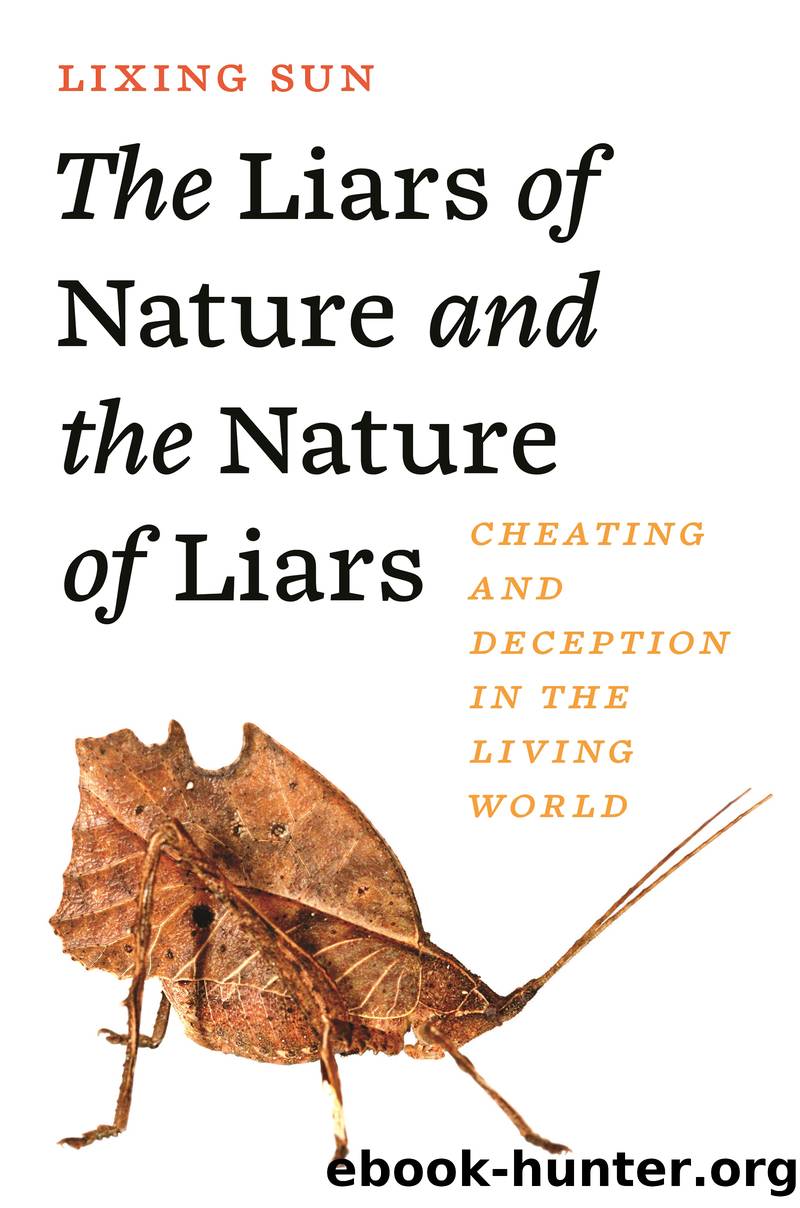The Liars of Nature and the Nature of Liars by Lixing Sun;

Author:Lixing Sun;
Language: eng
Format: epub
Publisher: Princeton University Press
Published: 2022-12-06T00:00:00+00:00
How do cheaters choose their prey? Abagnale selected his victims carefully for his check frauds. He preferred to deal with naïve-looking people such as young female bank tellers who were easily distracted by his handsome physique, flirtatious demeanor, and apparently respectable profession. In his own words, âItâs not how good a check looks but how good the person behind the check looks that influences tellers and cashiers.â
Selection of victims can be more systematic. Consider this. Many of us have received emails from some Nigerian princes, pledging to send millions of dollars for a joint business venture. If you fall for the offer, youâll be asked to pay a few hundred dollars as âthe processing fee.â
The scam is so transparent that you may wonder why the putative princes would even bother to send the messageâagain, again, and again. The scammers are by no means stupid. On the contrary, the messages that seem so plainly fake to most of us are intentionally crafted to screen for people who have the right mental loopholes. The logic: if you canât see the obvious problem in the message, your judgment is sufficiently impaired to make you a potential victim. In other words, the scammers prey on people who lack the judgmentâthose who have mental loopholes that make them miss the obvious. Itâs not difficult to guess that most of their victims are the elderly with declining cognitive abilities.
The Nigerian prince scam is an example of what I call individual cheating, directly targeting fellow humansâspouses, friends, relatives, coworkers, acquaintances, business partners, total strangersâfor resources such as money, sex, and social status. Individual cheating surprises nobody because a wide range of animals cheat in just this way, as we all resort to the two laws of cheating that are quite familiar to us now.
What sets humans apart from other animalsâincluding our close primate relatives such as chimps and bonobosâis what I call institutional cheating. This is cheating on rules and systemsâtaxes, voting processes, educational tests, or business opportunities. In this kind of cheating, the victims are not individual humans, but impersonal organizationsâincluding firms, schools, NGOs, and governments. This was what Abagnaleâs frauds were mainly aimed at. âMy targets,â he confessed, âhad always been corporate targetsâbanks, airlines, hotels, motels or other establishments protected by insurance.â
The prevalence of our social, economic, and cultural institutions opens a whole new world of opportunities to cheat. The victims are ultimately still people, but their individual identities are often unknown or difficult to define, so they are far less likely to provoke our sympathy. For example, if Bank of America loses a million dollars, you may just shrug and say, âThatâs a shame!â But your feelings would be totally different if $10,000 were stolen from John Doe or Jane Smith, who in your mind is a kind person with a ready smile. For that reason, cheating on institutions may not carry the same moral status as cheating on individuals, as Abagnale experienced. At times, cheaters may even feel justified, like Robin Hood, if the organization they attack has a less-than-stellar reputation.
Download
This site does not store any files on its server. We only index and link to content provided by other sites. Please contact the content providers to delete copyright contents if any and email us, we'll remove relevant links or contents immediately.
| Amphibians | Animal Behavior & Communication |
| Animal Psychology | Ichthyology |
| Invertebrates | Mammals |
| Ornithology | Primatology |
| Reptiles |
Sapiens: A Brief History of Humankind by Yuval Noah Harari(13986)
The Tidewater Tales by John Barth(12391)
Mastermind: How to Think Like Sherlock Holmes by Maria Konnikova(6936)
Do No Harm Stories of Life, Death and Brain Surgery by Henry Marsh(6686)
The Thirst by Nesbo Jo(6437)
Why We Sleep: Unlocking the Power of Sleep and Dreams by Matthew Walker(6352)
Life 3.0: Being Human in the Age of Artificial Intelligence by Tegmark Max(5184)
Sapiens by Yuval Noah Harari(5122)
The Longevity Diet by Valter Longo(4857)
The Body: A Guide for Occupants by Bill Bryson(4583)
The Rules Do Not Apply by Ariel Levy(4523)
The Immortal Life of Henrietta Lacks by Rebecca Skloot(4255)
Why We Sleep by Matthew Walker(4190)
Animal Frequency by Melissa Alvarez(4150)
Yoga Anatomy by Kaminoff Leslie(4100)
The Hacking of the American Mind by Robert H. Lustig(4085)
All Creatures Great and Small by James Herriot(3986)
Barron's AP Biology by Goldberg M.S. Deborah T(3944)
Double Down (Diary of a Wimpy Kid Book 11) by Jeff Kinney(3925)
